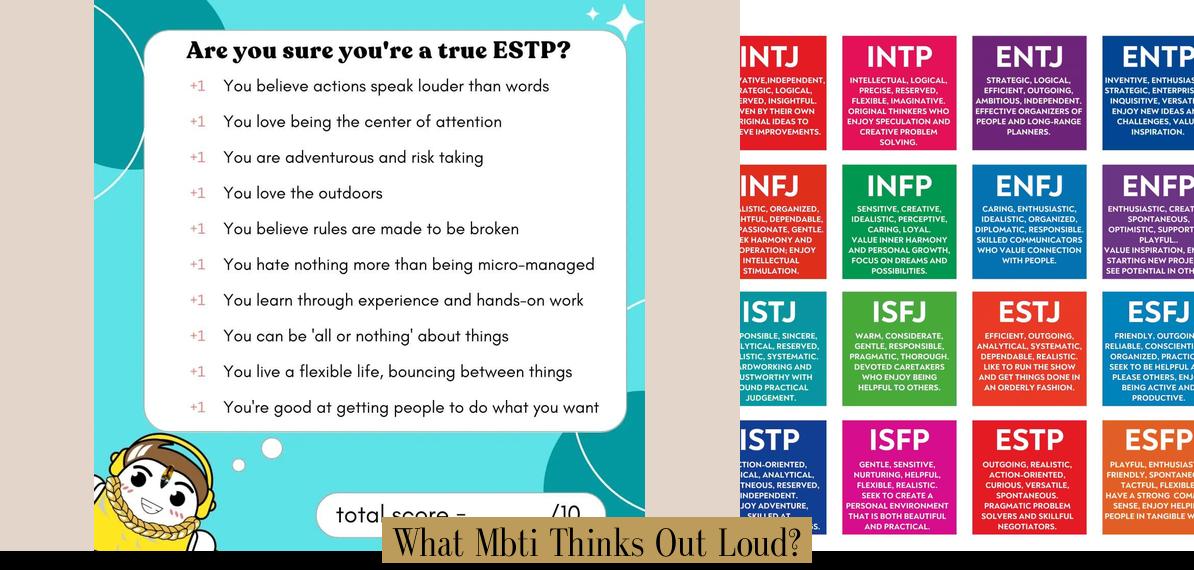What MBTI thinks out loud? (And why it’s a little bit like a game of charades)
Ever heard someone say, “I think out loud” and wonder, “Is that just a quirk, or is there a deeper reason behind it?” Well, buckle up, because we’re diving headfirst into the world of MBTI and exploring the fascinating link between personality types and this particular vocal tic.
Think of it like this: Imagine a room full of people, each with their own unique way of processing information. Some are like quiet observers, internalizing everything before sharing their thoughts. Others are like walking, talking brainstorming sessions, throwing ideas out into the ether and seeing what sticks.
That’s where MBTI comes in. It’s like a personality decoder, offering insights into how we prefer to take in and process information. And, believe it or not, some types are more prone to thinking out loud than others.
The Thinking Out Loud Club: Where Introspection Takes a Backseat
Now, let’s get to the heart of the matter: Who are these vocal thinkers, and why are they so comfortable letting their thoughts spill out for everyone to hear?
ENTJ: The Visionary Strategist
Meet the ENTJs, the masterminds of the MBTI world. They’re the ones with the grand vision, the strategic mind, and a penchant for transforming ideas into reality. Their dominant function, Extraverted Thinking (Te), is a force to be reckoned with, driving them to organize, structure, and achieve. It’s like a well-oiled machine, constantly churning out ideas and plans. And guess what? To keep that machine running smoothly, ENTJs need to externalize their thoughts. They’ll talk through their plans, brainstorm out loud, and use others as a sounding board to refine their strategies. Think of it like a verbal chess game, where each spoken word is a strategic move.
ESTJ: The Practical Planner
ESTJs are like the pragmatic organizers of the MBTI universe. They thrive on efficiency, structure, and getting things done. Their dominant function, Extraverted Thinking (Te), also drives them to think out loud, but in a more practical, action-oriented way. They’ll talk through logistics, break down tasks, and share their practical insights. Think of them as the voice of reason, keeping things grounded and focused.
Extroverts: The Social Butterflies
Speaking of thinking out loud, let’s not forget about the extroverts, those social butterflies who love to connect and share their ideas. They’re the ones who thrive in conversations, bouncing ideas off others and engaging in lively debates. For them, thinking out loud is a natural way to explore their thoughts and connect with the world around them.
ENTP: The Debater
ENTPs, the master debaters of the MBTI world, also have a knack for thinking out loud. Their dominant function, Extraverted Intuition (Ne), fuels their constant exploration of ideas. They’re always brainstorming, generating new concepts, and challenging the status quo. Their minds are like a whirlwind of possibilities, and they need to express those ideas verbally to make sense of them. Think of them as the walking, talking thought experiments, always ready to engage in a stimulating intellectual discussion.
ESFP: The Entertainer
ESFPs, the life of the party, are also known for their tendency to think out loud. Their dominant function, Extraverted Sensing (Se), makes them highly aware of their surroundings and the people around them. They’re natural communicators, expressing themselves through lively storytelling and engaging interactions. Their thoughts tend to flow out naturally, and they enjoy sharing their experiences and perspectives with others. Think of them like walking, talking anecdotes, always ready to entertain and engage.
The Quiet Types: A World of Internal Reflections
Now, while some personality types embrace the art of thinking out loud, others prefer to keep their thoughts tucked away in their minds. Think of them as the introspective thinkers, the ones who prefer to process information internally before sharing their insights.
INFP: The Idealist
INFPs, the idealists of the MBTI world, are known for their quiet, introspective nature. Their dominant function, Introverted Feeling (Fi), drives them to explore their values, beliefs, and emotions deeply. They’re often lost in their own thoughts, pondering the complexities of life and seeking meaning in their experiences. While they may share their insights with trusted friends and loved ones, they tend to keep their inner world private, preferring to process their thoughts internally.
INTJ: The Mastermind
INTJs, the masterminds of the MBTI world, are also known for their quiet, strategic nature. Their dominant function, Introverted Intuition (Ni), allows them to see patterns and develop complex strategies. They’re often deep in thought, contemplating the big picture and envisioning future possibilities. While they may share their ideas with others, they prefer to process their thoughts internally, carefully considering all angles before sharing their conclusions.
The Thinking Out Loud Spectrum: It’s Not Always Black and White
It’s important to remember that MBTI is a spectrum, not a rigid framework. While some personality types are more likely to think out loud than others, there are always exceptions to the rule. Your individual experiences, environment, and personal preferences all play a role in how you process information and share your thoughts. And, let’s be real, sometimes, we all just need to vent our frustrations or brainstorm an idea out loud, regardless of our MBTI type.
So, the next time you hear someone thinking out loud, don’t just dismiss it as a quirk. It could be a sign of their dominant function at work, helping them to process information and make sense of the world around them. After all, we all have our own unique ways of navigating the world, and thinking out loud is just one of the many ways we express ourselves.
Now, go forth and embrace your inner thinker, loud or quiet, and don’t be afraid to let your thoughts flow!
